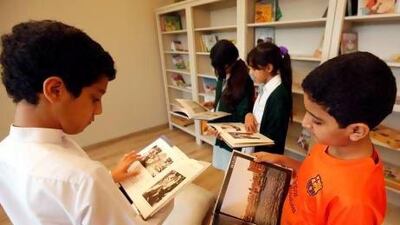DUBAI // An Arabic centre is hoping to revive the language among Emirati children.
Iqra'a, which was set up two months ago and has already enrolled about 40 youngsters, aims to reverse a steady decline in Arabic among younger generations.
"A trend of Arabs moving away from Arabic has developed over the years in the UAE and we now have new generations with a very weak mother tongue," said Yusra Al Hashimi, the owner of the centre.
"After observing this trend I came to think about this project, but what really made me determined was a news article in 2009 on the deterioration of Arabic teaching in schools and how this was affecting the love for the language among students."
Mrs Yusra said her generation's Arabic skills were strong partly because private education was not as common when she was at school.
"We cannot blame this development on the children. Several factors have caused this, namely the lack of enthusiasm for Arabic among parents and the weakness of Arabic in private schools, which is where most Emiratis and other Arabs are now educated."
The children at the centre, aged 7 to 14, attend private schools. Many are uncomfortable with Arabic and dislike learning it.
"It is sad that the level of teaching of the language of our land is so bad," Ms Al Hashimi said. "All the children have the same opinion about Arabic classes, they find them repulsive."
The centre offers 10 hour-long courses for children costing Dh85 an hour. It also offers Arabic courses for foreigners at Dh65 per hour.
"We want to teach Arabic in a fun and interesting way," Mrs Yusra said. "There should be a connection with their daily lives, something that is currently lacking but that we are developing at our centre.
"The parents who enrolled their children are now aware of the importance of the mother tongue.
"They fear their children will graduate from university still unable to write Arabic. They understand the language is connected to identity and religion and that their children, because they do not read Arabic, cannot relate to the society they live in."
One parent who enrolled her children, Umm Abdullah, said she also grew up with poor Arabic skills.
"Having learnt from my own experience of not being able to express myself strongly enough in Arabic, I was determined to speak to my children only in Arabic. Unfortunately I failed," said the mother of four. "I was most successful with my first child and then it went downhill."
Umm Abdullah went to a private school and spoke only English with her friends, even the Arabs. Her efforts to have Arabic as the main language at home failed because "everything around them is in English".
Her two eldest daughters attend the centre. "There is something wrong in the teaching of Arabic in their school," she said. "The children do not like the Arabic classes. It's different at the centre. Here they are enjoying it."
Manal Najibi's two sons attend classes. She banned English at home but her children's Arabic still suffers.
"I put them in International Baccalaureate curriculum schools because the level of education is better but it has affected their Arabic," she said. "Despite a ban on English at home the language is part of their lives everywhere else."
wissa@thenational.ae

